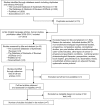Methods to improve rehabilitation of patients following breast cancer surgery: a review of systematic reviews
- PMID: 25792854
- PMCID: PMC4360828
- DOI: 10.2147/BCTT.S47012
Methods to improve rehabilitation of patients following breast cancer surgery: a review of systematic reviews
Abstract
Context: Breast cancer is the most prevalent cancer amongst women but it has the highest survival rates amongst all cancer. Rehabilitation therapy of post-treatment effects from cancer and its treatment is needed to improve functioning and quality of life. This review investigated the range of methods for improving physical, psychosocial, occupational, and social wellbeing in women with breast cancer after receiving breast cancer surgery.
Method: A search for articles published in English between the years 2009 and 2014 was carried out using The Cochrane Database of Systematic Reviews, the Database of Abstracts of Reviews of Effects, PubMed, and ScienceDirect. Search terms included: 'breast cancer', 'breast carcinoma', 'surgery', 'mastectomy', 'lumpectomy', 'breast conservation', 'axillary lymph node dissection', 'rehabilitation', 'therapy', 'physiotherapy', 'occupational therapy', 'psychological', 'psychosocial', 'psychotherapy', 'exercise', 'physical activity', 'cognitive', 'occupational', 'alternative', 'complementary', and 'systematic review'.
Study selection: Systematic reviews on the effectiveness of rehabilitation methods in improving post-operative physical, and psychological outcomes for breast cancer were selected. Sixteen articles met all the eligibility criteria and were included in the review.
Data extraction: Included review year, study aim, total number of participants included, and results.
Data synthesis: Evidence for exercise rehabilitation is predominantly in the improvement of shoulder mobility and limb strength. Inconclusive results exist for a range of rehabilitation methods (physical, psycho-education, nutritional, alternative-complementary methods) for addressing the domains of psychosocial, cognitive, and occupational outcomes.
Conclusion: There is good evidence for narrowly-focused exercise rehabilitation in improving physical outcome particularly for shoulder mobility and lymphedema. There were inconclusive results for methods to improve psychosocial, cognitive, and occupational outcomes. There were no reviews on broader performance areas and lifestyle factors to enable effective living after treatment. The review suggests that comprehensiveness and effectiveness of post-operative breast cancer rehabilitation should consider patients' self-management approaches towards lifestyle redesign, and incorporate health promotion aspects, in light of the fact that breast cancer is now taking the form of a chronic illness with longer survivorship years.
Keywords: breast cancer surgery; lifestyle redesign; quality of life; rehabilitation methods; self-management; symptom-management.
Figures
Similar articles
-
A comprehensive approach to rehabilitation interventions following breast cancer treatment - a systematic review of systematic reviews.BMC Cancer. 2019 May 20;19(1):472. doi: 10.1186/s12885-019-5648-7. BMC Cancer. 2019. PMID: 31109309 Free PMC article.
-
Promoting and supporting self-management for adults living in the community with physical chronic illness: A systematic review of the effectiveness and meaningfulness of the patient-practitioner encounter.JBI Libr Syst Rev. 2009;7(13):492-582. doi: 10.11124/01938924-200907130-00001. JBI Libr Syst Rev. 2009. PMID: 27819974
-
Palliative care experiences of adult cancer patients from ethnocultural groups: a qualitative systematic review protocol.JBI Database System Rev Implement Rep. 2015 Jan;13(1):99-111. doi: 10.11124/jbisrir-2015-1809. JBI Database System Rev Implement Rep. 2015. PMID: 26447011
-
Pre-operative rehabilitation in lower-limb amputation patients and its effect on post-operative outcomes.Med Hypotheses. 2020 Oct;143:110134. doi: 10.1016/j.mehy.2020.110134. Epub 2020 Jul 26. Med Hypotheses. 2020. PMID: 33017911
-
Home-based physical activity interventions for breast cancer patients receiving primary therapy: a systematic review.Breast Cancer Res Treat. 2019 Dec;178(3):513-522. doi: 10.1007/s10549-019-05424-4. Epub 2019 Sep 6. Breast Cancer Res Treat. 2019. PMID: 31493034
Cited by
-
Experiences of Patients with Breast Cancer Participating in a Prehabilitation Program: A Qualitative Study.J Clin Med. 2024 Jun 26;13(13):3732. doi: 10.3390/jcm13133732. J Clin Med. 2024. PMID: 38999298 Free PMC article.
-
Lower limb lymphedema in lung adenocarcinoma: Two case reports.Mol Clin Oncol. 2016 Oct;5(4):478-479. doi: 10.3892/mco.2016.988. Epub 2016 Aug 10. Mol Clin Oncol. 2016. PMID: 27699046 Free PMC article.
-
Evaluating the effect of upper-body morbidity on quality of life following primary breast cancer treatment: a systematic review and meta-analysis.J Cancer Surviv. 2024 Oct;18(5):1517-1547. doi: 10.1007/s11764-023-01395-0. Epub 2023 May 18. J Cancer Surviv. 2024. PMID: 37199900 Free PMC article.
-
Effects of occupational therapy on quality of life in breast cancer patients: A systematic review and meta-analysis.Medicine (Baltimore). 2023 Aug 4;102(31):e34484. doi: 10.1097/MD.0000000000034484. Medicine (Baltimore). 2023. PMID: 37543817 Free PMC article.
-
Efficacy and efficiency of a new therapeutic approach based on activity-oriented proprioceptive antiedema therapy (TAPA) for edema reduction and improved occupational performance in the rehabilitation of breast cancer-related arm lymphedema in women: a controlled, randomized clinical trial.BMC Cancer. 2020 Nov 9;20(1):1074. doi: 10.1186/s12885-020-07558-x. BMC Cancer. 2020. PMID: 33167921 Free PMC article.
References
-
- Ferlay J, Shin HR, Bray F, Forman D, Mathers C, Parkin DM. Estimates of worldwide burden of cancer in 2008: GLOBOCAN 2008. Int J Cancer. 2010;127(12):2893–2917. - PubMed
-
- cancer.org [homepage on the Internet] American Cancer Society Cancer Facts and Figures 2012. Atlanta: American Cancer Society; [Accessed January 31, 2015]. Available from: http://www.cancer.org/research/cancerfactsfigures/cancerfactsfigures/can....
-
- Marín ÁP, Sánchez AR, Arranz EE, Auñón PZ, Barón MG. Adjuvant chemotherapy for breast cancer and cognitive impairment. South Med J. 2009;102(9):929–934. - PubMed
-
- Meade E, Dowling M. Early breast cancer: diagnosis, treatment and survivorship. Br J Nurs. 2012;21(17):S4–S8. - PubMed
Publication types
LinkOut - more resources
Full Text Sources
Miscellaneous


